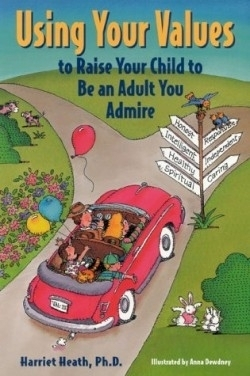Using Your Values to Raise Your Child to Be an Adult You Admire
Those who failed to embrace the religious right in the 1980s may be troubled by this book’s title. Not that long ago, “family values” was shorthand for a certain conservative political and moral perspective: if you didn’t have a traditional family (two married parents of opposite sexes plus a couple of kids of identical parentage), then your values were at best questionable. By contrast, Heath, a developmental and school psychologist, has written a very inclusive guide to values clarification that all kinds of parents (and people thinking about becoming parents, and kids trying to understand their parents) can use to advantage.
The premise of the book is very simple: parents need to identify and define their personal values before they can impose those values on their children. She contends that this is especially important because most people possess multiple values that may dictate conflicting behavior at times. She gives the example of a child who receives a duplicate gift: does the child embody the value of caring and say “thank you” graciously, or does she tell the giver that she already has this toy, acting with honesty? How should the parent respond to the child’s behavior?
Heath recognizes human diversity on a variety of levels. She provides several different exercises parents can use to clarify their beliefs. The reader is encouraged to choose the exercise that is most in line with their preferred learning style. She likewise annotates her parenting guidelines with information on how to instill a desired value in a child based upon the child’s learning style as well as age. Dewdney’s illustrations show families of different ethnic groups, and Heath’s talks about “parenting partners” rather than assuming that parents are always spouses.
While it’s difficult to write an unbiased book, Heath’s professionalism and her experience as a psychologist allows her to speak with a friendly yet nonjudgmental voice. Her own liberal leanings are noticed here and there, such as in a role-play in which a child asks what’s wrong with using marijuana and his parent responds that if the child chooses to do that, his parents would have to restrict his driving privileges. This and other examples, however, are clearly presented as suggestions about how to recognize, analyze and respond to value conflicts, rather than impositions of the author’s personal beliefs. This book is a collection of sensible thinking tools for parents and children, presented in a highly accessible format.
Reviewed by
Laurene Sorensen
Disclosure: This article is not an endorsement, but a review. The publisher of this book provided free copies of the book to have their book reviewed by a professional reviewer. No fee was paid by the publisher for this review. Foreword Reviews only recommends books that we love. Foreword Magazine, Inc. is disclosing this in accordance with the Federal Trade Commission’s 16 CFR, Part 255.

